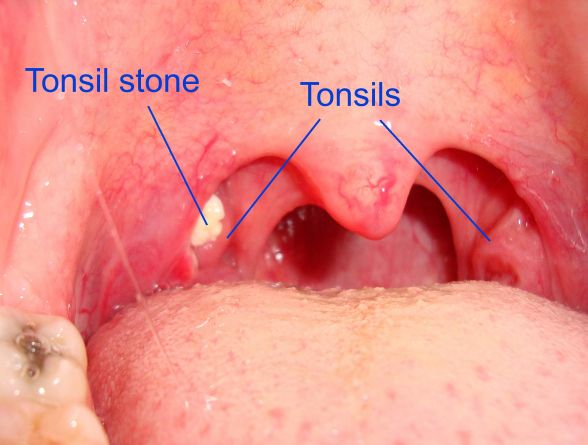Tonsil stones, also called tonsilloliths, are a common issue affecting many people. These small whitish masses that form in the tonsillar crypts can cause significant discomfort and bad breath. Let’s explore everything you need to know about this phenomenon.
What are tonsil stones?
Tonsil stones appear as small white or yellowish balls that accumulate in the folds of the tonsils (the “crypts”). These deposits consist of food debris, dead cells, and bacteria that gradually calcify and smell very bad. Tonsil stones aren’t dangerous but shouldn’t be confused with strep throat or tonsillitis.

Main symptoms of tonsil stones
The main symptoms of tonsil stones include :
- Persistent bad breath (halitosis)
- Visible white spots on tonsils
- Foreign body sensation in throat
- Occasional sore throat
Causes of tonsil stones
Many factors could ease the apparition of tonsil stones :
- Poor oral hygiene
- Cryptic tonsils (with many folds)
- Chronic tonsil inflammation
- Acid reflux
However, causes aren’t always easy to determine definitively. Some ENT doctors admit that tonsil stones can appear at one point in your life then disappear at another without understanding why. Nevertheless, some agree that tonsil stones could initially be caused by various infections, particularly bacterial infections (like streptococcus) or viral infections (such as adenoviruses, influenza virus, etc).
Solutions to remove tonsil stones
To disloge the stones, several methods can be used :
- Using a water flosser (solution generally preferred by ENTs during office visits)
- Using a cotton swab (often dipped in mouthwash first)
We’ve written an article on this topic, right here.
In any case, these solutions aim to dislodge the tonsil stones but don’t necessarily prevent their reappearance after a few days/weeks.
More definitive and radical solutions may also be proposed:
- Reducing tonsil size (and crypts) using laser
- Tonsil removal
Of course, these more drastic solutions should be discussed with your healthcare provider.
Prevention of tonsil stones
To avoid the formation of tonsil stones, it is usually recommended to:
- Maintain excellent oral hygiene
- Drink enough water
- Practice regular gargling
- Consult an ENT for recurring problems
Indeed, tonsil stones are often dislodged naturally when eating/drinking and are swallowed (which is harmless). Additionally, good hydration and oral hygiene make it more difficult for new stones to form. However, they may continue to appear for several months.
When to see a doctor
It is recommended to see a doctor if :
- Tonsil stones persist despite natural treatments
- Tonsils are very inflamed
- Swallowing becomes painful
- Bad breath is socially complicated
Conclusion
Tonsil stones are a benign but bothersome problem. Good oral hygiene and appropriate care can help control them: that’s what this blog is about! If they persist, don’t hesitate to consult a specialist to consider appropriate treatment.
